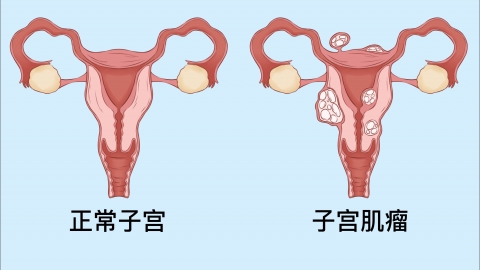What should I do about uterine fibroids?
Generally, uterine fibroids may be caused by long-term mental stress, hormonal fluctuations, adenomyosis, polycystic ovary syndrome (PCOS), or red degeneration of uterine fibroids. It is recommended to seek timely medical consultation, identify the underlying cause, and improve the condition under a doctor's guidance through lifestyle adjustments, medication, and other methods. A detailed analysis is as follows:

1. Long-term mental stress: Prolonged high-pressure states can lead to endocrine disorders and abnormal estrogen secretion, which stimulates the proliferation of uterine smooth muscle and the formation of fibroids, often accompanied by menstrual irregularities. Stress can be relieved through exercise, meditation, and other methods, helping maintain emotional stability, avoiding chronic anxiety and tension, and regulating hormone levels.
2. Hormonal fluctuations: In women of reproductive age, unstable estrogen and progesterone levels can continuously stimulate uterine tissue, making fibroids more likely to develop, particularly in women aged 30–50 years. Maintaining a regular sleep-wake cycle, avoiding late nights, and reducing exogenous hormone intake (e.g., limiting the use of cosmetics containing hormones) can help maintain stable hormone levels.
3. Adenomyosis: The invasion of endometrial tissue into the muscular layer of the uterus can stimulate myometrial proliferation and may be accompanied by fibroid formation. This condition often presents with worsening dysmenorrhea and increased menstrual bleeding. Medications such as norgestrel capsules, danazol capsules, and levonorgestrel-releasing intrauterine systems should be used under medical guidance to inhibit endometrial hyperplasia and alleviate symptoms.
4. Polycystic ovary syndrome (PCOS): Ovarian dysfunction leading to excessive androgen secretion indirectly affects estrogen metabolism and promotes fibroid growth, often accompanied by ovulatory dysfunction. Under medical guidance, medications such as ethinyl estradiol/cyproterone acetate tablets, drospirenone/ethinyl estradiol tablets, and metformin hydrochloride tablets may be used to regulate hormone levels and improve ovarian function.
5. Red degeneration of uterine fibroids: This occurs when fibroids undergo ischemia and necrosis, leading to red degeneration, which may cause abdominal pain and fever, commonly occurring during pregnancy. Under medical supervision, medications such as ceftriaxone sodium for injection, metronidazole for injection, and ibuprofen sustained-release capsules may be used to control infection and relieve pain.
In daily life, it is important to maintain a light diet and reduce the intake of foods high in estrogen, such as royal jelly. Regular gynecological ultrasound examinations should be conducted to monitor changes in fibroid size. Comprehensive management can help control fibroid growth and maintain uterine health.





